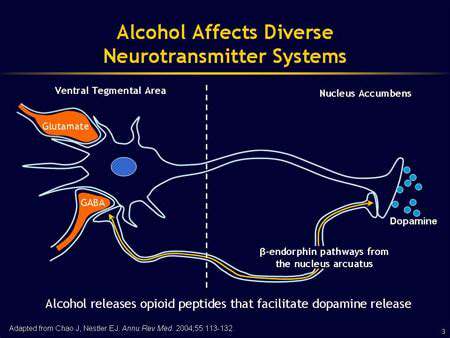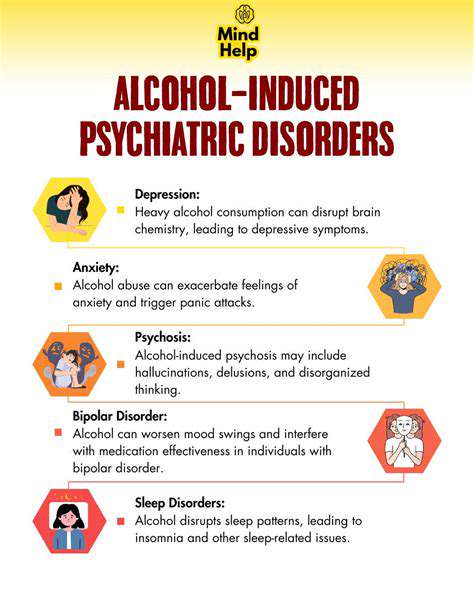The Link Between Alcohol Induced Anxiety and Mental Health
How Alcohol Disrupts Brain Chemistry

The Dopamine Dilemma
Alcohol dramatically alters the brain's reward pathways through its manipulation of dopamine. This critical neurotransmitter governs both our sense of pleasure and our drive to pursue rewarding experiences. When alcohol enters the system, it triggers an artificial dopamine spike, creating temporary euphoria that reinforces drinking behavior. However, this artificial stimulation comes at a cost - the subsequent dopamine crash often leaves individuals feeling emotionally drained and dissatisfied. These rollercoaster fluctuations in dopamine activity form the neurological foundation for alcohol addiction.
Researchers continue investigating the nuanced relationship between alcohol and dopamine systems. Current studies suggest the brain attempts to compensate for these artificial surges by reducing natural dopamine production, creating a vicious cycle of dependence that requires increasingly larger alcohol amounts to achieve the same effect.
GABA System Overload
As the brain's primary inhibitory neurotransmitter, GABA normally helps maintain balanced neural activity. Alcohol dangerously amplifies GABA's sedating effects, effectively putting the brakes on normal brain function. This explains characteristic alcohol-induced impairments like slurred speech, poor coordination, and risky decision-making. The GABA system's central role in alcohol's effects makes it a prime target for medications aiming to reduce alcohol cravings and withdrawal symptoms.
By hyperactivating GABA receptors, alcohol creates widespread neural suppression that disrupts everything from basic motor skills to higher cognitive functions. This global slowdown explains why even moderate drinking impairs reaction times comparable to sleep deprivation.
Glutamate System Disruption
Glutamate serves as the brain's primary excitatory neurotransmitter, essential for learning and memory formation. Unlike its straightforward effect on GABA, alcohol's impact on glutamate involves complex, time-dependent changes. While acute exposure may briefly increase glutamate activity, chronic alcohol use damages glutamate receptors and reduces their effectiveness. These changes contribute significantly to the memory lapses and learning difficulties common among long-term heavy drinkers.
The Inflammatory Consequences
Prolonged alcohol exposure triggers destructive neuroinflammatory processes that accelerate brain aging. This inflammation damages neural structures and disrupts vital communication pathways between brain regions. Emerging research suggests these inflammatory mechanisms may explain why alcohol abuse often leads to premature cognitive decline and increased dementia risk.
The cumulative neurological damage from chronic drinking manifests in diverse ways, making early intervention critical for preventing permanent impairment. Cutting-edge studies now focus on anti-inflammatory approaches that might protect the brain from alcohol's most devastating effects.
How Alcohol Worsens Existing Health Problems

Liver Under Siege
For individuals with existing liver conditions, alcohol acts like gasoline on a fire. The liver's detoxification capacity becomes overwhelmed by alcohol's toxic metabolites, accelerating tissue damage and functional decline. This process explains why moderate drinking guidelines are often stricter for those with pre-existing liver concerns. Beyond cirrhosis, alcohol-induced liver inflammation can trigger cascading health complications affecting multiple organ systems.
Cardiovascular Risks Amplified
Alcohol's cardiovascular effects present particular dangers for those with heart conditions. The temporary vasodilation followed by rebound constriction creates dangerous blood pressure fluctuations. For individuals with coronary artery disease, these hemodynamic stresses can precipitate acute cardiac events with potentially fatal consequences. Recent studies also highlight alcohol's role in promoting arrhythmias, even in previously healthy individuals.
Mental Health Complications
The relationship between alcohol and mental health disorders creates a destructive feedback loop. While initially providing temporary relief from anxiety symptoms, alcohol ultimately exacerbates neurotransmitter imbalances that underlie mood disorders. This explains why alcohol dependence frequently co-occurs with conditions like depression and anxiety, each worsening the other in a downward spiral.
Treatment professionals increasingly emphasize complete abstinence during mental health treatment, as even moderate alcohol use can interfere with medication effectiveness and therapy progress. The temporary relief alcohol provides ultimately comes at the cost of prolonged recovery and increased relapse risk.
Systemic Health Consequences
Alcohol's systemic effects create vulnerabilities across multiple body systems. Nutrient malabsorption leads to deficiencies that impair immune function and tissue repair. The digestive system suffers direct chemical damage from alcohol's corrosive effects, while indirect consequences include impaired gut microbiome balance and increased intestinal permeability.
Emerging research continues uncovering new ways alcohol compromises health, from disrupting endocrine function to accelerating cellular aging. These widespread effects make alcohol particularly dangerous for individuals managing chronic health conditions, as it can undermine treatment effectiveness and accelerate disease progression.